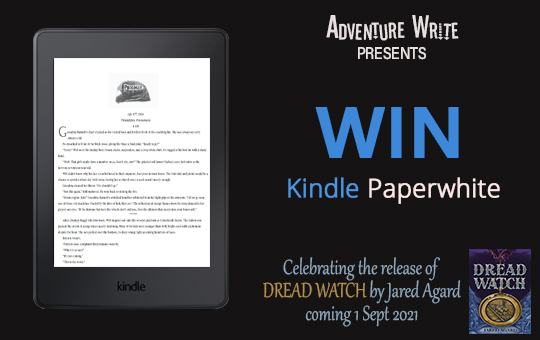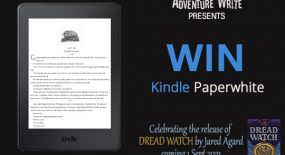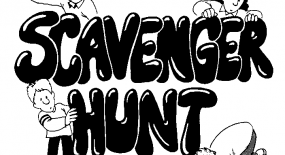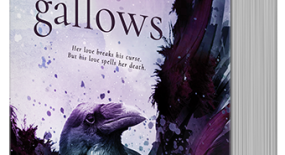{Bonus Giveaway + Hunt} YA Scavenger Hunt
 Welcome to the YA Scavenger Hunt!
Welcome to the YA Scavenger Hunt!
Go to the YA  Scavenger Hunt page to find out all about the hunt. There are eight contests going on simultaneously, and you can enter one or all! This post is part of the PURPLE TEAM–but there is also a red team, an orange team, a gold team, a green team, and a blue team. Each team has a whole different set of books you could win!
Scavenger Hunt page to find out all about the hunt. There are eight contests going on simultaneously, and you can enter one or all! This post is part of the PURPLE TEAM–but there is also a red team, an orange team, a gold team, a green team, and a blue team. Each team has a whole different set of books you could win!
If you’d like to find out more about the hunt, see links to all the authors participating, and see the full list of prizes up for grabs, go to the YA Scavenger Hunt page.
Today I’m hosting author A.E. Decker (Ann) on the Eerie Blog for the YA Scavenger Hunt.
Goodreads: Meddlers Goodreads
 Before there was The Falling of Moon, there was this little guy.
Before there was The Falling of Moon, there was this little guy.
My name is A. E. Decker, and I’m the author of The Falling of the Moon, the first novel in the Moonfall Mayhem series, published by World Weaver Press. Back in 2007, I was working as a doll-maker. I had a shop at a RenFaire, and a vendor’s stand at several conventions. Between bouts of sewing, I wrote fanfiction, or pieces of novels that ended up going nowhere. I didn’t know it at the time, but I was looking for a story. I found it in tufts of alpaca wool, pipe cleaners, and two big, orange eyes, all twisted into the shape of a bat-winged kitty.
As soon as I finished this little critter, I knew he had a tale to tell. Because I was so busy, I figured I’d write a short, sweet middle-grade book where my bat-winged kitty, who I’d dubbed “Moony,” would help his hapless owner out of a series of difficulties. I figured I’d base my story on “Puss in Boots,” and give it a vampiric twist, both for fun and to match Moony’s fangs and bat-wings.
Then I asked the question that changed everything: Why did the miller (or, in my case, the Count) only leave his third son a cat in his will?
What if the third son was a daughter, and the Count only left her a cat because he figured she was only going to marry and leave his family anyway? This is a scenario that happened within my own family, and it thinking about it changed my perspective of the entire story. Suddenly the protagonist was no longer Moony, but Ascot, the Count’s daughter, who had to learn how to tell fact from fantasy in a world of fairytales gone awry. And suddenly, my book went from a single middle-grade novel to a five book YA series.
What didn’t change was that, at its heart, The Falling of the Moon remains a story about stories. We humans are very good at making narratives of our lives, but sometimes, like Ascot, we fail to recognize when we’re following the story that’s set out for us because we want to, and when we’re doing it because we’re “supposed” to. If my readers get anything out of the Moonfall Mayhem series—aside from enjoyment, I hope!—it’s the thought that to truly live our lives to the fullest, we must sometimes veer from the script.
Anyway, as a special treat to those taking part in the fall 2016 YA Scavenger Hunt, I thought it would be fun to go through The Falling of the Moon and point out references to specific stories I’ve hidden in the text. At least, the ones I can remember. (Embarrassed cough.) See if you can guess them before I tell you!
Chapter 116, “Mourning Become Eclectic,” contains two references. Here’s the first, to kick things off:
“He can’t be worse,” said Ascot. She looked up at the spiders. “Can he?”
“Serves you right if they instantly weave a giant ‘yes’ into their webs,” said Vlad.
“No, spiders only write when there’s some goat or pig they want to praise.”
Pretty easy, right? It is, of course, a reference to E. B. White’s Charlotte’s Web. The second is trickier and less literary in nature, hidden in the description of Ascot’s faithful companion, Moony:
Moony grinned. Even for a Vicardi cat he was tiny, dark gray save for a pale muzzle and a white streak above his right eye such as a mad barber might sport. Two bat-wings sprouted from his back, just large enough to allow him to flutter, and his thick, bushy tail crackled with static. Taken altogether, he resembled something that had been left out in the rain to attract lightning.
Any ideas? Concentrate on the phrase “mad barber,” and you just might…attend the tale of Sweeney Todd! I’ve always been a Stephen Sondheim fan, and the first draft of The Falling of the Moon was written in 2007, the year Tim Burton’s film version of the show came out. Johnny Depp’s white streak somehow made it into the story.
Chapter two, “The Heir Cut,” starts with what is probably the most significant reference in the whole book:
Half an hour afterwards, at precisely three o’ clock, Count von Abberdorf’s scaly green lawyer crept up the hill to preside over the reading of the will.
Vincent inherited the castle.
Vlad received Igor.
Ascot got Moony.
If you’re having trouble with this one, think “mill” instead of “castle” and “donkey” instead of “Igor.” Then, take a look at Moony, up at top. That’s right—this is a “Puss-in-Boots” reference; the story that kicked off my entire adventure of writing the Moonfall Mayhem series.
Skipping ahead to chapter four, “There’s Always a Catch,” we have two slightly obscure references in a single paragraph:
Rags-n-Bones located a shop with a tiny sword on display. It had been pawned by a dwarf who ran away from the circus to become an accountant, and the proprietor gladly traded it for a pair of silver candlesticks.
I’m betting the “pair of silver candlesticks” might sound familiar to several readers. It’s a reference to the pivotal scene from Victor Hugo’s Les Miserables, where the kindly bishop gives Jean Valjean his valuable silver rather than let him be arrested. I couldn’t resist sliding it in.
But the “dwarf running away from the circus” bit is also a reference; just an oblique one. I am a tremendous admirer of Terry Pratchett’s work, and one of his Discworld novels, Making Money, features a clown who does indeed run away from the circus to work in a bank. When is Death going to bring Pratchett back, by the way?
Moving on, the title of chapter five, “Canines and Punishment,” is an obvious reference to Dostoyevsky, the favorite novelist of Dmitri, my very erudite talking wolf character. I enjoy making up the chapter titles, by the way, even if I sometimes feel I spend too much time on them!
Here’s one from chapter six, “Winning Friends and Influencing People,” that I’m sure you’ll get in an instant.
“Does anyone know anything about Prince Parvanel?” she asked.
“He’s blond and handsome and likes frogs,” said Rags-n-Bones, swinging by his ankles from the branch of a nearby maple.
Nothing tricky here: it’s a reference to the “The Frog Prince.” My reluctant prince needed a quirk, but instead of turning into a frog, as your sensible, classic fairytale prince would do, he simply wants to be a herpetologist instead.
Chapters ten through twelve deal with the ball; one of the central scenes in the novel. You can’t have a proper fairytale princess story without a ball. A lot of the tropes I’m spoofing in this section come straight from the Disney movies, where some girl in a poofy-sleeved gown always seems to have a bluebird twittering on their fingers, and mice in hats running about their feet.
Of course, in The Falling of the Moon, the friendly little animals are used to engage in acts of sabotage. But there is one scene in chapter eleven, “The Lapdogs of War,” that I want to point out specifically.
“Enjoying yourself?” asked Catch, dipping Ascot at the end of a note. The man possessed a certain grace; she had to give him that. But not much else.
“I’d rather you were Prince Parvanel.”
“I can’t say I feel the same.” He smiled. White teeth, surprisingly sharp.
Romantic leads who think they don’t like each other, dancing together? Hello, Pride and Prejudice! It’s almost impossible to write such a scene without thinking of Jane Austen’s masterpiece.
Back to an easy one, this time from chapter thirteen, “The Not-so Secret Garden.” (Which is, itself a reference to Frances Hodgson Burnett’s The Secret Garden, but that’s too obvious, isn’t it?)
“That’s right,” said Maggie. “I hear a couple of hucksters sold this one king what they claimed was a magic robe, only they really had him walking around in the nip.”
A king in the nip? That’s “The Emperor’s New Clothes,” of course.
Chapter Sixteen, “The Grapes of Wrath”—yes, Steinbeck—introduces a homage to one of my favorite pieces of literature in the person of perhaps the silliest character I’ve yet created.
Didn’t Catch mention that Jeck was beheaded? Yes, he had. Of course. A headless horseman. Was there some clause stating that if you died of decapitation you had to come back with your rump plunked on a horse’s back?
Jeck the Chipper, the subject of the above paragraph, is thus far the only character from the Moonfall Mayhem series to get his own short story, “Death and Taxes,” published in World Weaver Press’ Specter Spectacular anthology. Considering he was originally intended to be a one-note joke character, he came a long way. And, as you have no doubt surmised, he is based off the most famous of all headless ghosts from Washington Irving’s The Legend of Sleepy Hollow.
There’s a section in Chapter Twenty-three, “Amazement,” that I can’t quote here without risk of spoiling a plot twist for those who haven’t read The Falling of the Moon, (What are you waiting for, by the way?) but it refers to Catch, who is, in turn, a reference to “Snow White.” Long ago, an art teacher brought in a picture book of the story with the most wonderful illustrations. The image of the huntsman in particular captivated me. Instead of being the usual, paunchy middle-aged fellow he’s portrayed as, he was young and slim and wearing a long coat, staring indifferently to the side as Snow White pleaded for his life. I’ve never forgotten that picture, and have often tried to catch it in writing. (See what I did there?) Anyway, if you look for them, you’ll find quite a few nods to Catch as the huntsman throughout The Falling of the Moon.
I’ve never seen that book again, by the way, despite searching for it. Catch is an elusive character, too.
Last reference! This is from chapter twenty-seven, “Boxing Day.”
Ascot turned her attention to the red cushion with its keys. Each one had a scrap of paper tied to its bow with a silk ribbon. A seventh curl of paper lay all alone. Taking up each in turn, Ascot read the words aloud.
The gold key. “Who chooses me risks their heart.”
The silver key. “Who chooses me chances their happiness.”
The glass key. “Who chooses me dares mockery.”
The black key. “Who chooses me gambles with fortune.”
The white key. “Who chooses me wagers their future.”
The ugly iron key. “Who chooses me hazards their soul.”
The solo scrap. “Who chooses me invites mysteries.”
This was one of the scenes I had planned from very early on, and it never really changed. The box challenge is straight of out William Shakespeare’s Merchant of Venice, except Ascot doesn’t have a helpful song playing in the background, whose rhymes point her to the right answer.
Ascot’s story continues in The Meddlers of Moonshine, which will be published on October 25th. Thank you for participating in the fall 2016 YA Scavenger Hunt. Good luck! As a final bonus, here are two pictures of my sister’s version of Moony. My eyesight’s gotten too dopey for doll-making, but her skills are still sharp.
Go now, and write your life into a beautiful story.

















Leave a Comment